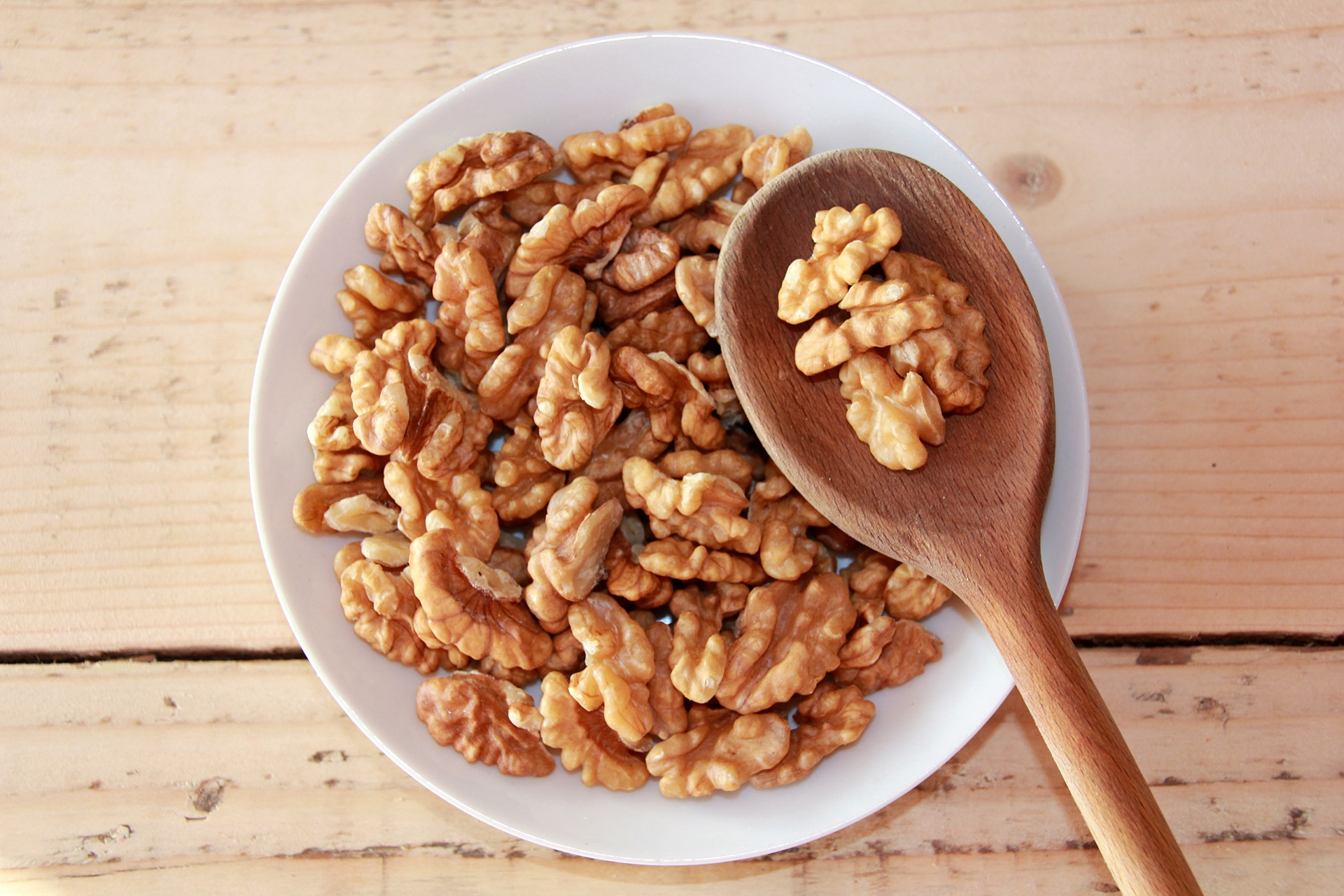Walnuts health benefits go far beyond just being a tasty snack. These nutrient-rich nuts pack a powerful punch when it comes to improving overall well-being. Whether you’re trying to lower cholesterol, manage weight, or support brain function, walnuts can play a crucial role in your diet.
Among all tree nuts, walnuts stand out for their high concentration of ALA omega-3 fatty acids, antioxidants, and essential micronutrients. They’re not only heart-smart but also beneficial for metabolic, cognitive, and reproductive health. So, if you’ve ever asked yourself, “Are walnuts good for you?” or “Are walnuts healthy?”, the science says a resounding yes.
In this article, we’ll explore 15 science-backed walnuts benefits, covering everything from nutrition facts to how many walnuts to eat per day. Plus, we’ll share expert tips, practical advice, and even potential downsides to give you the complete picture of this superfood.
What Are Walnuts?
Walnuts are edible seeds from the tree genus Juglans, most commonly the English walnut (Juglans regia). Native to Central Asia and the Mediterranean, walnuts have been consumed for thousands of years. Today, they are widely cultivated in countries like the United States, China, and Iran.
What makes walnuts exceptional is their nutrient-dense profile. Unlike many other nuts, walnuts contain significant amounts of alpha-linolenic acid (ALA), a plant-based omega-3 fatty acid that plays a vital role in heart and brain health. They’re also a rich source of antioxidants, fiber, and plant-based protein.
Not only are walnuts versatile in culinary use, but their dense nutritional value has earned them a place on the table of health enthusiasts, dietitians, and medical professionals worldwide.
Nutritional Composition of Walnuts
Here is a quick overview of walnut nutrition facts per 1-ounce (28-gram) serving:
Nutrient Amount Calories in walnuts 185 kcal Total Fat 18.5 g Saturated Fat 1.7 g Polyunsaturated Fat 13.4 g Monounsaturated Fat 2.5 g Protein in walnuts 4.3 g Carbohydrates 3.9 g Fiber 1.9 g Sugars 0.7 g Magnesium 45 mg (11% DV) Copper 0.45 mg (50% DV) Manganese 1.0 mg (48% DV) Vitamin B6 0.2 mg (15% DV) Folate 27.0 mcg (7% DV) Phosphorus 98 mg (10% DV)
These numbers highlight how walnuts nutrition is especially beneficial for heart, brain, and metabolic health.
15 Walnuts Health Benefits
1. Nutritional Powerhouse
When it comes to nutritional density, walnuts dominate the list of healthiest foods on the planet. They deliver a powerful blend of healthy fats, plant-based protein, dietary fiber, and vital minerals. With nearly 19 grams of fat per ounce, they may seem like a high-calorie snack, but these fats are mostly polyunsaturated—the good kind your body needs.
One standout component is the ALA omega-3 fatty acid, unique to walnuts among tree nuts. Omega-3s are known for their anti-inflammatory properties, and their benefits extend to heart, brain, and joint health. That’s why many dietitians recommend walnuts as a part of anti-inflammatory or Mediterranean-style diets.
In terms of micronutrients, walnuts shine with high levels of magnesium, copper, and manganese. These elements play roles in everything from energy production and immune function to bone development. The presence of vitamin B6 and folate also supports nervous system health and red blood cell production.
Adding walnuts to your meals is an easy way to increase your intake of antioxidants, protein, and fiber without consuming empty calories. With this combination, it’s clear why they’re called a nutritional powerhouse.
Chronic inflammation is a root cause of many modern diseases, including heart disease, cancer, and autoimmune disorders. The good news? Walnuts are loaded with anti-inflammatory compounds that help your body combat this silent killer.
One of the primary reasons walnuts reduce inflammation is their high content of polyphenols and omega-3 fatty acids. Polyphenols are plant-based compounds that neutralize free radicals, which otherwise trigger inflammation. Combined with ALA, these nutrients create a powerful anti-inflammatory synergy.
A notable study published in the Journal of the American College of Nutrition found that regular walnut consumption reduced levels of C-reactive protein (CRP), a key marker of inflammation in the body. Participants who ate walnuts daily showed measurable improvement in inflammatory biomarkers.
If you’re asking “Are walnuts good for your health?” when dealing with chronic inflammation, the science says yes. Including walnuts regularly in your diet could be a natural, food-based way to reduce inflammation without relying on medication.
Your gut microbiome plays a pivotal role in immunity, metabolism, and even mental health. Emerging research shows that walnuts support a healthy gut by nourishing beneficial bacteria.
Walnuts contain prebiotic fibers and polyphenols that act as food for good gut bacteria. These compounds pass undigested into the colon, where they promote the growth of Lactobacillus, Bifidobacteria, and other friendly microbes. As these bacteria ferment the fibers, they produce short-chain fatty acids that reduce gut inflammation and improve colon health.
A 2018 study from the Journal of Nutrition demonstrated that participants who consumed 42 grams of walnuts daily for eight weeks showed a significant increase in beneficial gut bacteria and diversity of the microbiome. This is particularly important as gut diversity is linked to stronger immunity and lower disease risk.
So if you’ve been wondering, “Are walnuts healthy for digestion?” the answer is a confident yes. With their microbiome-boosting properties, walnuts may help you build a stronger, healthier gut from the inside out.

4. Supports Weight Management
Despite their high fat and calorie content, walnuts can aid in weight control. Their unique nutritional profile—rich in unsaturated fats, protein, and fiber- helps promote feelings of fullness and reduces overall calorie intake.
Studies have shown that walnuts may influence appetite regulation in the brain. A randomized controlled trial published in Diabetes, Obesity and Metabolism revealed that walnut consumption activated areas in the brain associated with self-control and reduced cravings for high-fat, high-sugar foods.
Moreover, long-term studies have demonstrated that diets including walnuts do not lead to weight gain and may even contribute to modest weight loss. This is because the body doesn’t absorb all the calories in walnuts due to their complex structure and fiber content.
So, if you’re looking to manage your weight and have been asking, “How many walnuts to eat per day for weight control?”, a small handful (about 1 ounce) can be an effective, satisfying, and nutrient-rich snack option.
Walnuts have been shown to improve several risk factors associated with type 2 diabetes, including blood sugar control, insulin sensitivity, and weight management. Their high content of healthy fats, fiber, and antioxidants supports metabolic health in multiple ways.
In one study published in the Journal of Nutrition, participants with type 2 diabetes who consumed walnuts daily for three months saw a significant reduction in fasting insulin levels and improved insulin response. These changes were observed even in individuals who did not lose weight during the trial.
Additionally, walnuts help reduce oxidative stress, a key factor in the progression of diabetes. Their antioxidants combat cellular damage caused by high blood sugar levels, contributing to better long-term glucose regulation.
If you’re managing type 2 diabetes and wondering, “Are walnuts good for your health?”, especially regarding blood sugar, the evidence strongly supports including them as part of a balanced, whole-food diet.
6. May Reduce Blood Pressure
High blood pressure, or hypertension, is one of the most common and dangerous risk factors for heart disease and stroke. Fortunately, walnuts health benefits extend to supporting cardiovascular wellness, including blood pressure regulation. Thanks to their rich nutrient profile, particularly magnesium, potassium, and ALA omega-3 fatty acids, walnuts help promote more relaxed blood vessels and better circulation.
Magnesium is known to help blood vessels dilate, which lowers resistance and reduces blood pressure. Potassium works by balancing sodium levels and easing tension in the walls of blood vessels. Meanwhile, the omega-3s in walnuts have anti-inflammatory effects that further reduce arterial stiffness, a key contributor to high blood pressure.
Clinical studies have backed up these claims. For example, the American Journal of Clinical Nutrition published findings showing that individuals who incorporated walnuts into their diet saw modest but significant reductions in systolic blood pressure. These effects were observed in both healthy individuals and those with elevated cardiovascular risk, making walnuts a practical, food-based approach to hypertension management.
So, if you’ve been wondering, “Are walnuts good for your health, especially for your heart?”, the answer is a resounding yes. Including just a small serving of walnuts in your daily routine may offer protective benefits for your blood vessels, helping to keep your heart pumping stronger for longer. Whether you’re trying to prevent high blood pressure or already managing it, the health benefits of walnuts make them a valuable addition to your diet.
7. Promotes Healthy Aging
Aging is inevitable, but how you age can be influenced by your lifestyle, particularly your diet. One of the more underrated walnuts health benefits is their potential to support healthy aging by reducing oxidative stress, chronic inflammation, and cellular damage. Walnuts are packed with bioactive compounds that help slow the biological aging process from the inside out.
Oxidative stress is a major driver of aging and age-related diseases. It occurs when free radicals—unstable molecules—damage your cells and DNA.
Antioxidants found in walnuts, including polyphenols, melatonin, and vitamin E, combat these free radicals and help maintain cellular integrity. Walnuts also reduce chronic inflammation, which is closely tied to aging-related decline in cognition, mobility, and immune function.
Several observational studies have drawn a direct line between walnut consumption and longevity. A 2018 analysis of data from the Nurses’ Health Study and Health Professionals Follow-Up Study found that individuals who consumed walnuts at least five times a week had a significantly lower risk of death from any cause, especially from cardiovascular diseases and cancer.
Moreover, walnuts support brain function, joint health, and heart performance—all critical for aging well. So if you’re asking, “Are walnuts good for your health as you age?”, the answer is clear. With their anti-aging nutrients and disease-fighting properties, walnuts can help you live not just longer, but better.

8. Boosts Brain Function
One of the most celebrated walnuts health benefits is their positive impact on brain function. Thanks to a powerful combination of omega-3 fatty acids, polyphenols, and vitamin E, walnuts serve as a natural brain booster that supports cognitive performance, memory, and mood.
The high ALA omega-3 content in walnuts is critical for brain health. Omega-3s form an essential part of brain cell membranes and help reduce neuroinflammation. Polyphenols found in walnuts have also been shown to reduce oxidative stress in the brain, helping to preserve mental sharpness with age.
Studies support these claims. Research published in The Journal of Nutrition, Health & Aging found that higher walnut consumption was associated with improved cognitive test scores, including memory, concentration, and information processing speed. The benefits were especially noticeable in older adults.
If you’re asking, “Are walnuts good for your brain?”, the evidence makes it clear: a small handful a day could help you stay mentally sharp, focused, and resilient against cognitive decline.
Another lesser-known benefit of walnuts is their potential to enhance reproductive health, particularly in men. Walnuts are packed with nutrients that support hormonal balance and improve fertility markers, making them a natural ally in reproductive wellness.
A 2012 study in the journal Biology of Reproduction found that men who consumed 75 grams of walnuts daily for 12 weeks experienced significant improvements in sperm quality, including motility, vitality, and morphology. The polyunsaturated fats and antioxidants in walnuts are thought to enhance testicular function and sperm integrity.
Beyond sperm health, walnuts may also play a role in hormonal balance. Healthy fats are essential for testosterone production and overall endocrine function. The presence of zinc, selenium, and vitamin E in walnuts further supports reproductive hormone regulation.
So if you’re wondering, “Are walnuts good for you if you’re trying to conceive?”, the answer is yes—especially for men looking to improve fertility naturally.
Elevated blood lipids, such as LDL cholesterol and triglycerides, are major risk factors for cardiovascular disease. Walnuts have been shown to significantly improve blood fat profiles, thanks to their healthy fat composition and antioxidant content.
Numerous studies show that walnut consumption can lower LDL (bad) cholesterol and triglyceride levels. At the same time, walnuts may help maintain or slightly increase HDL (good) cholesterol, which protects the heart.
Compared to diets high in saturated fats, a diet that includes walnuts, rich in polyunsaturated fats, leads to more favorable lipid profiles. The Annals of Internal Medicine published findings that diets including walnuts improved cholesterol more than diets that used olive oil alone.
If you’re concerned about your cholesterol and wondering about walnut pros and cons, this is a major pro: Walnuts can be a powerful, natural tool to optimize your lipid profile and protect your cardiovascular system.
Cardiovascular health is one of the most researched and proven walnuts health benefits. Walnuts contribute to a healthy heart through several mechanisms: reducing inflammation, improving lipid profiles, and enhancing vascular function.
The ALA omega-3 fatty acids in walnuts reduce the risk of arrhythmias and plaque buildup in the arteries. Additionally, their antioxidant content reduces oxidative stress that can damage blood vessels over time.
Walnuts also improve endothelial function, the ability of blood vessels to dilate and contract efficiently. This function is essential for maintaining normal blood pressure and circulation.
The famous PREDIMED study, a long-term clinical trial on the Mediterranean diet, found that participants who included nuts like walnuts in their diets had significantly fewer heart attacks and strokes. If you’re asking, “Are walnuts good for your heart?”—the data doesn’t lie.
12. Cancer Prevention Potential
Emerging research suggests that walnuts may help reduce the risk of certain cancers. This benefit is largely attributed to their high levels of polyphenols and antioxidants, which help prevent oxidative damage to cells and DNA.
Walnuts contain ellagitannins, compounds that the gut microbiota convert into urolithins—metabolites known for their anti-inflammatory and anti-cancer properties. These metabolites can slow the growth of cancer cells and even induce apoptosis (programmed cell death) in some cases.
Animal studies have shown promising results in breast and prostate cancer. Mice fed with walnuts exhibited slower tumor growth and fewer cancer cells than those on standard diets. While more human research is needed, the results are encouraging.
Incorporating walnuts into a balanced, plant-rich diet could be a proactive way to lower your cancer risk. They’re not a magic bullet, but as part of a healthy lifestyle, walnuts offer compelling protective benefits.
Antioxidants are compounds that help neutralize harmful free radicals in the body. Walnuts’ nutrition includes some of the highest antioxidant levels among commonly eaten nuts, making them a powerful ally against oxidative stress and cellular aging.
Key antioxidants in walnuts include ellagic acid, melatonin, and catechin. These compounds are primarily found in the walnut’s skin, so it’s best to eat them with the skins intact for maximum benefit.
Comparative studies show that walnuts outperform pecans, almonds, and pistachios in antioxidant potency. The Journal of Agricultural and Food Chemistry rated walnuts as the top nut for antioxidant activity.
Whether you’re trying to support immune function, protect your skin, or reduce your risk of chronic disease, the antioxidant power of walnuts adds another layer to their broad spectrum of health benefits.

Dietary fiber plays a crucial role in digestive health, weight management, and cholesterol control, and walnuts offer a respectable 2 grams of fiber per ounce. While they aren’t the highest-fiber nut, their contribution to daily fiber intake is significant.
Fiber in walnuts helps slow digestion, stabilize blood sugar, and promote satiety, which can prevent overeating. This makes them a great snack choice for people looking to lose weight or manage type 2 diabetes.
Additionally, fiber supports healthy cholesterol levels by binding to LDL cholesterol in the digestive tract and removing it from the body. This adds to the cardiovascular benefits of walnuts.
If you’re aiming to increase your daily fiber intake and want to know “Are walnuts good for your digestion and heart?”—yes, they check both boxes.
Last but not least, one of the most practical benefits of walnuts is how easy they are to add to your daily routine. Their flavor and texture make them ideal for a wide variety of meals and snacks.
You can toss walnuts on oatmeal, blend them into smoothies, sprinkle them over salads, or bake them into muffins. They pair well with both sweet and savory dishes, making them one of the most versatile nuts in the kitchen.
To keep them fresh, store walnuts in the fridge or freezer. Because of their high oil content, they can go rancid if left at room temperature too long. Buying in bulk and storing them properly ensures you always have a healthy option on hand.
They’re also widely available—found in grocery stores, bulk food markets, and organic shops alike. Whether you’re focused on taste or nutrition, walnuts deliver.
Adverse Effects and Considerations
Walnut Allergies
While most people tolerate walnuts well, they are a common allergen, especially in children. Symptoms of walnut allergy include itching, swelling, hives, and in severe cases, anaphylaxis. Anyone with a known tree nut allergy should avoid walnuts entirely.
Phytic Acid and Mineral Absorption
Like many nuts and seeds, walnuts contain phytic acid, which can bind to minerals like calcium, iron, and zinc and inhibit their absorption. While this is generally not an issue for people with balanced diets, those relying heavily on nuts should consider rotating food sources and using preparation methods like soaking or roasting to reduce phytate content.
Being mindful of potential downsides helps you make informed choices, so you can maximize the benefits without unintended drawbacks.

Final Thoughts on Walnuts Health Benefits
To sum it up, walnuts’ health benefits are wide-ranging, scientifically supported, and deeply impactful. From reducing inflammation and supporting heart health to enhancing brain function and aiding in weight control, walnuts are one of the most complete superfoods you can add to your diet.
But balance matters. While they are nutrient-dense, walnuts are also high in calories, so portion control is key. Aim for about 1 ounce (14 walnut halves) per day to reap the benefits without overdoing it.
So the next time you’re wondering, “Are walnuts good for you?”—rest assured, they’re one of the best foods you can snack on for long-term health.




